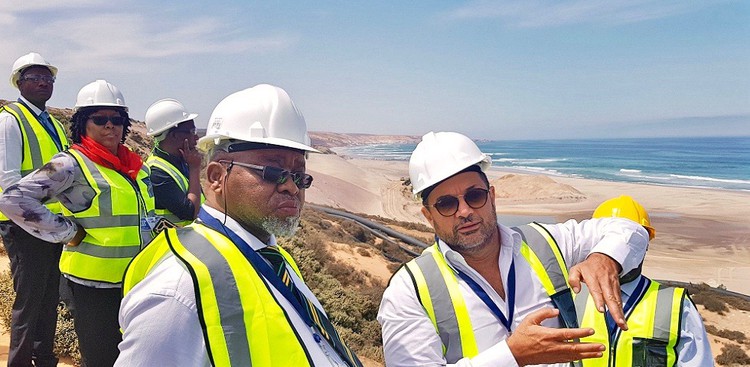
Australian mining executive Mark Caruso, right, with Mineral Resources Minister Gwede Mantashe, second from right, and senior DMR department officials during an inspection of Tormin mineral sands mine on the West Coast last week. Photo: Gwede Mantashe’s Twitter account
12 February 2019
Over the past five years the Tormin mine on the West Coast has extracted vast amounts of valuable minerals like zircon, ilmenite, rutile and garnet. In 2017, over two million tons of sand produced minerals netting revenues of R830 million for the Australian mining company, Mineral Commodities Ltd (MRC), which operates Tormin through its South African subsidiary Mineral Sands Resources (MSR).
According to its annual report, Tormin exceeded both its 2017 budget and the previous year’s operational performance, helping MRC to achieve a record operational and financial performance with total revenue of US$62.6 million (about R855 million) and a net after tax profit of US$9.9 million (about R135 million).
Mineral Resources Minister Gwede Mantashe and senior officials visited the mine last week to check its level of compliance with environmental, social and labour plans, transformation, as well as health and safety.
Social activists, environmentalists and other government departments – notably the Western Cape Department of Environmental Affairs – have raised numerous concerns about alleged environmental and legal transgressions in Tormin’s operations, all of which are denied by the company.
One of the most serious relates to the cause of the catastrophic collapse of several parts of the sea cliff in front of Tormin’s processing plant, above the beach where the sand is mined. Critics argue that the collapses were caused partly by the mine’s processing operations and partly by mining within a 10-metre no-go area at the toe of the cliff on the beach.
Looking down on the beach with Mantashe, MRC executive chairman and chief executive Mark Caruso told the minister that the cliff collapses were “an issue you hear about continuously”. However, “experts” had determined that the collapses were because of natural erosion caused by wind and sea, and that the cliff had a “regressive erosion profile”.
Pointing out that the area had been the mouth of the Olifants River in a past geological era, Caruso said: “This is one of the wildest coastal areas in the world. Because of the wind and the weather, there’s very high energy, so the cliff is continually eroding … So you get this natural thing. We are not responsible, but it is a very sensitive issue.”
However, the “expert” the company has relied on to deny responsibility for the cliff collapses is South African-trained, Australia-based environmental and geological consultant Adriaan du Toit, who according to his LinkedIn profile and his CV on his company’s website worked extensively for both MRC and MSR for several years. He only parted company with MRC in June last year.
Caruso told Mantashe that any potential diamond-bearing gravel is separated from the sand and delivered to Trans Hex. MSR processes the remaining material. While MSR was obliged to observe a ten-metre no-mining exclusion zone at the toe of the cliff, Trans Hex was only subject to a five-metre restriction.
Mantashe asked, “So you keep to ten metres?”
Caruso replied, “Absolutely!”
Caruso also told Mantashe that the mining company was “proactively” rehabilitating the collapsed areas through infilling – “If you put sand there, the plants will rehabilitate.”
He explained that minerals mined at the beach, among the richest concentrated grades of naturally occurring minerals of this type anywhere in the world, were exported in a raw form to China and the US, but that the company planned to make some finished products, such as ceramic tiles, locally.
He pointed out that Tormin was the second-largest garnet mine in the world. According to MRC’s annual report, Tormin supplies around 25% of the world’s demand for garnet sands that year and 2% of the world’s zircon demand. It’s also one of the top 10 independent titanium feedstock suppliers.
According to MRC’s annual report, the company spent some R4.3 million at Tormin during 2017 on local community initiatives under its HDSA (Historically Disadvantaged South Africans) Social Labour Plan. These included bursaries, scholarships, traineeships, apprenticeships, adult basic education programmes, community based enterprise and infrastructure support development, and the sponsoring of full-time teachers at local schools.
MSR has submitted a Section 102 Extended Mining Rights Amendment Application to the Department of Mineral Resources (DMR) to substantially extend its existing Tormin mining right to include several beaches to the north, as well as to an inland strandline (a previous shoreline) east of the existing processing plant. This was after DMR had refused its prospecting application for this extended area.
But DMR did grant the mining company prospecting rights over some 4,500 hectares on two properties south of the existing Tormin mine that includes a substantial piece of coastline and some 15km of the northern bank of the Olifants River estuary.
This approval is currently the subject of several appeals.
Caruso told Mantashe that mining the existing beach would continue “until the permit comes through”.
Whether Mantashe and his senior DMR officials will issue the permit remains to be seen.